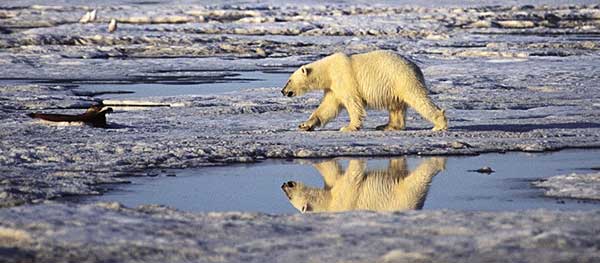New Arctic Battlelines Drawn As Industry Exploits Fragile Seas
By Lauren McCauley
03 March, 2016
Commondreams.org

Rapidly melting Arctic ice has opened up enormous swaths of this pristine and ecologically significant landscape to dangerous industrial threats. And as officials meet this week to hammer out new rules that could potentially protect the region, environmental groups are warning that the area known as the "Arctic Galapagos" is already in grave danger.
Scientists have reported that the Arctic is currently warming at nearly double the global average rate, which is one of the key factors driving an unprecedented level of ice sheet loss. In a troubling development, this January saw a record low for sea ice extent.
These newly-open waters have seen a surge in industrial activity, including fishing and shipping, which heretofore have been left largely unregulated, according to green groups.
Greenpeace on Wednesday released an investigation (pdf) which found that industrial fishing fleets are increasingly moving into Arctic waters, particularly the previously ice-covered Barents Sea, off of Norway.
"Sea ice loss in the northern Barents Sea is turning it into a new hunting ground for industrial fishing," Greenpeace states. "Fishing brings with it the threats of habitat degradation and bycatch, potentially wiping out marine life and putting this whole fragile ecosystem at risk."
The northern Barents Sea, known as the "Arctic Galapagos," is home to "a huge diversity of marine life including bowhead whales, walruses and polar bears, along with rare fish and invertebrates," the report states. It is also currently holds the largest cod stock in the world, which international fishing companies are rushing to exploit.
At the same time, environmentalists are raising concern about the uptick in shipping traffic moving through newly-open Arctic channels. Such traffic, warns John Kaltenstein, a marine policy analyst with Friends of the Earth (FOE), invites "the use of heavy fuel oil, harmful air emissions, and invasive species risk."
Less than 1.5 percent of the entire Arctic Ocean has any form of protected status. And while the International Maritime Organization's recently adopted Polar Code aims to establish a standard of safety for ships operating in Arctic waters, Kaltenstein notes that the actual text—expected to enter into force January 1, 2017—"does little to deal with the most urgent and far-reaching problems we face from Arctic shipping."
"Unfortunately, the shipping industry still behaves as if it were in the 1960s or 1970s, and the sad fact is that many countries both domestically and within international venues, such as the U.N.’s International Maritime Organization, coddle it," he states.
"It only takes one big spill to change everything," he continues, "remember Exxon Valdez. Incredibly, environmental policy surrounding Arctic shipping has become the equivalent of 'fingers crossed,' when it comes to grave threats such as heavy fuel oil spills, climate-warming emissions, and invasive species."
The warnings come as delegates from 15 European countries along with the European Union, known as the OSPAR commission, are meeting in Gothenburg, Sweden this week to discuss the formation of an Arctic Marine Protected Area (MPA) in the international waters north of Greenland.
Greenpeace describes the meeting, and the potential agreement, as a "make or break moment for Arctic protection."
"It is crucial that these areas are protected from destructive industrial activities, as they could be devastating for the species dependent on this area for survival," states the group, which notes that the region under consideration for protection "could be a potential habitat for ice dependent species in the future as the ice melts in other places."
Ironically, Greenpeace notes that as international waters, the Arctic is part of the "global commons, belonging to all mankind." However, "there is no protection at all."
This work is licensed under a Creative Commons Attribution-Share Alike 3.0 License

